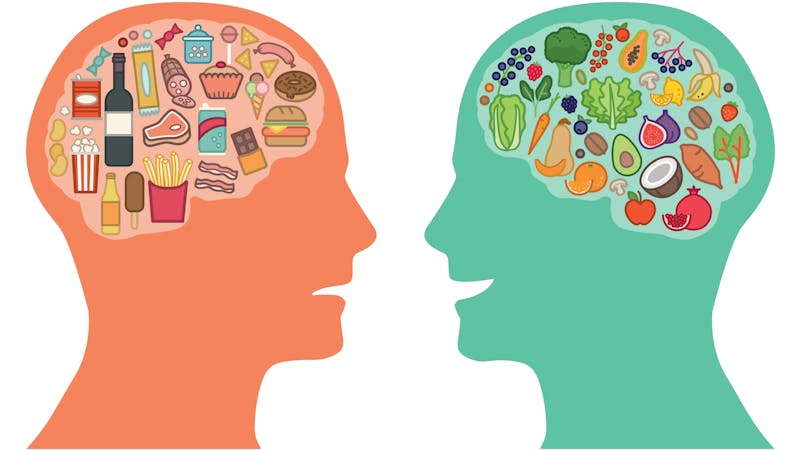Low carb and mental health:
Getting started and managing medications
- Should you try a low-carbohydrate
diet for your mental health? - Planning
- Reflection
- Consultation
- Baseline tests
- Medication management
- Antidepressants
- Antipsychotic medications
- Lithium
- Anticonvulsant mood stabilizers
- Blood-pressure medications
- When can I stop my medication?
- How do I stop my medication safely?
Are you suffering from a mental health issue like anxiety, depression, or ADHD? Do you wonder if changing your diet might help? In our guide, The food-mood connection, we discuss the new field of nutritional psychiatry and the emerging body of evidence that suggests eating a low-carbohydrate, whole-foods diet can improve mood and mental health.
Has hearing about low-carb diets sparked an interest in making a life-style change? We hope so! But if you are taking medication for mental health issues, you’ll need to do some planning before giving up your usual diet and easing into a low-carbohydrate eating plan. In this guide, we’ll cover how to prepare for the changes a low-carbohydrate eating pattern might make to your medications.
Should you try a low-carbohydrate diet for your mental health?
Although there is little human scientific data about low-carbohydrate diets and psychiatric disorders, what we do have is promising.1 It could be years before we see high-quality studies, but for those of you who don’t want to wait that long, rest assured there is plenty of scientific evidence demonstrating that low-carbohydrate diets are safe and healthy for almost everyone.2
Planning
Embarking on a new diet is potentially challenging for many of us, but if you are dealing with mental health issues, it can be even more difficult. Changing how you eat requires motivation, planning, sustained commitment, and major changes to familiar and comforting routines, which can be stressful. To increase your chances for success, choose a start date that doesn’t coincide with other major changes or ordeals in your life. If you’re too depressed to muster the will to begin, or too anxious to tolerate the stress of transitioning to a new diet, the short-term use of medication to help you bridge the gap may be worth considering.
Reflection
Take time to ask yourself these questions to assess your readiness for change, track your progress, and stay motivated. It may be helpful to discuss these questions with your health care providers as well.
- Why are you thinking about changing your diet?
- What do you hope to accomplish by changing your diet?
- How do you feel on your current diet? List emotions and behaviors you’ve been struggling with lately.
- How do you feel about medications? If you take psychiatric medications, make a list of their pros and cons.
- What do you anticipate may be the biggest challenges for you in changing your diet?
- Do you have people at home or in your social circle that you could rely on for support? If not, you may want to consider a support group, counselor, or coach.
Consultation
If you currently take medications of any kind, discuss the idea with your prescriber before making any changes to your diet.
Ideally, your prescribing clinician will be supportive of the idea and knowledgeable about low-carbohydrate diets — or at least open to learning. If not, please refer them to our continuing medical education course so they can become more educated about the therapeutic use of low-carb nutrition.
If they still are not open to your suggestions, you may want to consider either finding a new prescriber or asking your current prescriber if they would be willing to collaborate with a knowledgeable nutritionist, primary care clinician, or other health professional who has clinical experience with ketogenic diets and can help guide them in your care.
Once you start, make a plan with your clinicians for close monitoring. Ideally, you’ll want weekly appointments with your prescriber (or his/her staff), your therapist (if you see someone separately for counseling), and other collaborating health professionals, especially during the first six weeks of your new diet.
Baseline tests
Your blood pressure, heart rate, body weight, and waist circumference should be recorded before you change your diet and monitored along the way. Your clinician should also order blood tests before you change your diet. Helpful tests include:
- Fasting comprehensive metabolic panel (glucose, electrolytes, kidney function, liver function, and acid-base balance)
- Fasting lipid panel (includes HDL cholesterol and triglycerides)
- Fasting total insulin level
- Thyroid function panel
- Highly-sensitive C-reactive protein (hs-CRP)
- Serum uric acid3
- Medication blood levels if applicable (Lithium and Depakote are particularly important — see below)
- Any other tests your clinician recommends
Tests for nutrient deficiencies are worth considering as well. The most common vitamin and mineral deficiencies linked to psychiatric issues are vitamin B12, iron, zinc, and magnesium.4
GuideA low-carb diet is low in carbohydrates, primarily found in sugary foods, pasta and bread. Instead, you eat real foods including protein, natural fats and vegetables. Learn more about low carb and how to use it for your personal goals in this guide.
A low-carb diet for beginners
Medication management
Low-carbohydrate diets can cause rapid shifts in brain and body chemistry, some of which may impact medication levels, dosages, and side effects that require close medical supervision.5 This is particularly important in the first month or two while your metabolism adjusts to your new healthy way of eating.6
If you currently take medication for depression, anxiety, mood swings, sleep, attention, or psychosis and you are considering trying a low-carbohydrate or ketogenic diet for the first time, please read through the information that follows and consult with your mental healthcare provider. This section is not meant to be comprehensive, and each situation is unique, so always consult with your own health care provider for personalized advice.
Antidepressants7
Commonly-prescribed antidepressants include selective serotonin reuptake inhibitors (SSRIs), serotonin-norepinephrine reuptake inhibitors (SNRIs) and Wellbutrin (bupropion).
Examples of SSRIs include Zoloft (sertraline), Lexapro (escitalopram), and Prozac (fluoxetine). Examples of SNRIs include Effexor (venlafaxine) and Cymbalta (duloxetine).
These medicines don’t usually pose any special problems on low-carbohydrate diets, but some people do feel hungrier and gain weight on SSRIs and Effexor, which may make it harder to stick to a new diet of any kind. Increased appetite and weight gain are uncommon with Wellbutrin and Cymbalta.
Antipsychotic medications8
Antipsychotic medications such as Risperdal (risperidone), Abilify (aripiprazole), and Seroquel (quetiapine), can increase insulin levels and cause insulin resistance, which can make it harder for your body to generate ketones.9
It’s certainly possible to experience benefits from dietary changes even while continuing to take antipsychotic medications, but in some cases these medicines may eventually need to be tapered off completely in order to realize the full potential benefits of a ketogenic diet.10 Many medicines fall into the “antipsychotic” category, so if you’re not sure whether your medicine is an antipsychotic, check with your prescriber.
Lithium
During the first few days of a ketogenic diet, most people will lose a few pounds of excess water weight through urination because ketogenic diets change the way the body processes fluid and electrolytes (salts), including lithium, which is a salt.11 This means that lithium levels can be affected by ketogenic diets, so lithium levels should be measured before embarking on a ketogenic diet and monitored carefully along the way, to see if the dosage needs to be adjusted. It is very important to consume plenty of salt and pay attention to electrolytes like magnesium and potassium as well, particularly during the early phase of this diet.12
Anticonvulsant mood stabilizers13
Many anticonvulsant medications originally designed to control seizures are also prescribed by psychiatrists for mood swings, insomnia, or anxiety. The ones most likely to behave strangely when embarking on a ketogenic diet are Depakote (valproate), Zonegran (zonisamide), and Topamax (topiramate).
Depakote (valproate) is actually a fatty acid that can be burned by your cells for fuel. Since your body ramps up fat metabolism on a ketogenic diet, cells hungry for fat can remove Depakote molecules from your bloodstream and may cause Depakote blood levels to fall.14
Zonegran (zonisamide) and Topamax (topiramate) both change the way the kidney processes electrolytes (salts) and can make blood pH a little more acidic (metabolic acidosis), increasing risk for kidney stones.15 If you take either of these medicines, it’s important to stay well-hydrated to reduce your risk for kidney stones and to work closely with your medical provider who may want to check urine calcium, creatinine, citrate, pH, specific gravity and occult blood (microscopic amounts of blood in the urine that may indicate kidney stones). A common recommendation for people taking Zonegran or Topamax who want to reduce kidney stone risk is to eat a low-salt diet, but this may not be a good idea on a ketogenic diet, especially during the early adjustment period.16
Blood-pressure medications
Clonidine, Prazosin, and Propranolol were originally designed to treat high blood pressure, but they are also sometimes prescribed for insomnia, anxiety, nightmares, or ADHD 17. In the early stages of starting a low-carbohydrate diet, blood pressure may decrease as the body lets go of excess fluid.18 This can be a very healthy change, particularly if you have high blood pressure.
However, if you are taking a blood-pressure medicine, your blood pressure could fall too low, putting you at potential risk for lightheadedness, dizziness, and fatigue, with the worst-case scenario being that you could even pass out.19 This is why it’s important to have your blood pressure monitored along the way when trying a ketogenic diet and why blood pressure medicines may need to be reduced or stopped on a ketogenic diet. Many psychiatric medications also carry a small risk of lower blood pressure, including antipsychotic medications and SSRI antidepressants.
When can I stop my medication?
If you are excited about trying a low-carbohydrate diet in hopes that you may be able to reduce or eliminate one or more of your medications, that’s wonderful — but please be patient. Most medications should be continued until you’ve been solidly in ketosis for at least six weeks, which is the average amount of time it takes for the body to start using ketones efficiently for fuel.20 At the six-week mark, you and your clinician can discuss whether it makes sense to begin considering any reductions, but for some people, I believe that three months may be a more reasonable reflection point.
While nutrition is a major contributor to mental health, it’s certainly not the only factor, so some people will continue to need medication support, even with the healthiest of diets.21 There is no shame in taking medications that help you. Your well-being comes first.
How do I stop my medication safely?
Once you’ve adapted nicely to your new diet, depending on how you’re feeling, you and your clinician may decide to work toward possible medication reductions. Never stop any medicine abruptly! Always collaborate with your clinician, taper down very slowly, and change only one medicine at a time! Many psychiatric medicines can cause uncomfortable or even potentially dangerous withdrawal effects if not tapered slowly and carefully.22
Be aware that most psychiatric medications continue to affect brain chemistry for an average of six weeks after you stop taking them. For this reason, if you are taking more than one psychiatric medication, it may be wise to wait at least six weeks after you’ve completed one medication taper before considering whether to start tapering another medication. For example: if you finish taking an antidepressant such as Zoloft in early May, you won’t know for sure how you’re actually feeling without it until at least late June. If you start to taper a second medication during that six-week window, and your depression symptoms begin to return, you won’t know whether it’s because the Zoloft benefits are wearing off, or because you’ve begun tapering a second medicine.
Low-carb diets may offer relief to many who are experiencing mental health issues. However, every patient is different. Anyone taking psychiatric medications should plan ahead and consult with their doctor before embarking on what might be a life-changing dietary intervention.
If you have questions, please visit our FAQ on low-carb and mental health; perhaps your question is answered there!
Low carb and mental health: Getting started and managing medications - the evidence
This guide is written by Dr. Georgia Ede, MD and was last updated on September 30, 2022. It was medically reviewed by Dr. Bret Scher, MD on February 8, 2022.
The guide contains scientific references. You can find these in the notes throughout the text, and click the links to read the peer-reviewed scientific papers. When appropriate we include a grading of the strength of the evidence, with a link to our policy on this. Our evidence-based guides are updated at least once per year to reflect and reference the latest science on the topic.
All our evidence-based health guides are written or reviewed by medical doctors who are experts on the topic. To stay unbiased we show no ads, sell no physical products, and take no money from the industry. We're fully funded by the people, via an optional membership. Most information at Diet Doctor is free forever.
Read more about our policies and work with evidence-based guides, nutritional controversies, our editorial team, and our medical review board.
Should you find any inaccuracy in this guide, please email andreas@dietdoctor.com.
Neurocase 2013: The ketogenic diet for type II bipolar disorder [very weak evidence]
American Journal of Psychiatry 1965: A pilot study of the ketogenic diet in schizophrenia [very weak evidence]
Schizophrenia Research 2017: Ketogenic diet in the treatment of schizoaffective disorder: two case studies [very weak evidence] ↩
British Journal of Sports Medicine 2017: Evidence that supports the prescription of low-carbohydrate high-fat diets: a narrative review [strong evidence]
World Journal of Pediatrics 2017: Safety and tolerability of the ketogenic diet used for the treatment of refractory childhood epilepsy: a systematic review of published prospective studies [strong evidence]
Nutrition & Diabetes 2016: Short-term safety, tolerability and efficacy of a very low-calorie-ketogenic diet interventional weight loss program versus hypocaloric diet in patients with type 2 diabetes mellitus [strong evidence]
Frontiers in Endocrinology 2019: Long-term effects of a novel continuous remote care intervention including nutritional ketosis for the management of type 2 diabetes: A 2-year non-randomized clinical trial [weak evidence] ↩
New research found high uric acid levels are strongly associated with future switch from depression to bipolar disorder:Bipolar Disorders 2019: Serum uric acid as a predictor of bipolarity in individuals with a major depressive episode. [observational study, very weak evidence] ↩
Indian Journal of Psychiatry 2008: Understanding nutrition, depression and mental illnesses [overview article; ungraded] ↩
Pediatric Neurology 2007: The neuropharmacology of the ketogenic diet [overview article; ungraded] ↩
This is based on consistent clinical experience of low-carb practitioners. [weak evidence] ↩
Chonnam Medical Journal 2018 Addressing the side effects of contemporary antidepressant drugs: A comprehensive review [overview article; ungraded] ↩
World Psychiatry 2018: Management of common adverse effects of antipsychotic medications [overview article; ungraded] ↩
American Journal of Physiology—Endocrinology and Metabolism 2018: Antipsychotics and glucose metabolism: how brain and body collide [reviews of mechanisms; ungraded] ↩
This is based on consistent clinical experience of low-carb practitioners. [weak evidence] ↩
New England Journal of Medicine 1975: Renin, aldosterone and glucagon in the natriuresis of fasting [reviews of mechanisms; ungraded] ↩
This is based on clinical experience of low-carb practitioners and was unanimously agreed upon by our low-carb expert panel. You can learn more about our panel here [weak evidence]. ↩
Primary Care Companion to the Journal of Clinical Psychiatry 1999: Anticonvulsant Use in the Treatment of Bipolar Disorder: A Primer for Primary Care Physicians [overview article; ungraded] ↩
This is based on consistent clinical experience of low-carb practitioners. [weak evidence] ↩
Drugs 2018: Drug-induced kidney stones and crystalline nephropathy: pathophysiology, prevention and treatment [reviews of mechanisms; ungraded] ↩
This is based on consistent clinical experience of low-carb practitioners. [weak evidence] ↩
JAMA Psychiatry 1981: Effects of clonidine on anxiety disorders [randomized trial; moderate evidence]
PsychoPharm Review 2013: Beta-blockers: Off-label use in psychiatric disorders [overview article; ungraded]
↩Obesity Reviews 2012: Systematic review and meta-analysis of clinical trials of the effects of low carbohydrate diets on cardiovascular risk factors. [systematic review of randomized trials; strong evidence]
Obesity reviews 2009: Systematic review of randomized controlled trials of low-carbohydrate vs. low-fat/low-calorie diets in the management of obesity and its co-morbidities. [strong evidence] ↩
For more information, please see our evidence-based guide about starting a low-carb or keto diet when taking blood pressure medications. ↩
This is based on consistent clinical experience of low-carb practitioners. [weak evidence] ↩
This is based on consistent clinical experience of low-carb practitioners. [weak evidence] ↩
Addictive Behaviors 2019: A systematic review into the incidence, severity and duration of antidepressant withdrawal effects: Are guidelines evidence-based? [review of observational studies, weak evidence]
Psychiatry Online 2016: A Prescription for “Deprescribing” in Psychiatry [overview article; ungraded]
Psychothjerapy and Psychosomatics 2018: Discontinuing antidepressant drugs: Lesson from a failed trial and extensive clinical experience./strong> [overview article; ungraded]
↩



